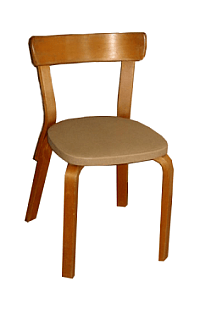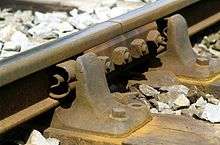Definify.com
Webster 1913 Edition
Chair
Chair
(châr)
, Noun.
1.
A movable single seat with a back.
2.
An official seat, as of a chief magistrate or a judge, but esp. that of a professor; hence, the office itself.
The
chair
of a philosophical school. Whewell.
A
chair
of philology. M. Arnold.
3.
The presiding officer of an assembly; a chairman;
as, to address the
. chair
4.
A vehicle for one person; either a sedan borne upon poles, or two-wheeled carriage, drawn by one horse; a gig.
Shak.
Think what an equipage thou hast in air,
And view with scorn two pages and a
And view with scorn two pages and a
chair
. Pope.
5.
An iron block used on railways to support the rails and secure them to the sleepers.
Chair days
, days of repose and age.
– To put into the chair
, to elect as president, or as chairman of a meeting.
Macaulay
. – To take the chair
, to assume the position of president, or of chairman of a meeting.
Chair
,Verb.
T.
[
imp. & p. p.
Chaired
; p. pr. & vb. n.
Chairing
.] 1.
To place in a chair.
2.
To carry publicly in a chair in triumph.
[Eng.]
Webster 1828 Edition
Chair
CHAIR
,Noun.
1.
A movable seat; a frame with a bottom made of different materials, used for persons to sit in; originally a stool, and anciently a kind of pulpit in churches.2.
A seat of justice or of authority; as a chair of state.3.
A seat for a professor, or his office; as the professors chair.4.
The seat for a speaker or presiding officer of a public council, or assembly, as the speakers chair; and by a metonymy, the speaker himself; as, to address the chair.5.
A sedan; a vehicle on poles borne by men.6.
A pulpit.7.
A two-wheeled carriage, drawn by one horse; a gig.8.
Supreme office or magistracy.When Governor Shute came to the chair, several of the old councilors were laid aside.
Curule chair, an ivory seat placed on a car, used by the prime magistrates of Rome.
Definition 2026
chair
chair
See also: chaïr
English

A chair (item of furniture).

Chairs (rail supports on a railway).
Noun
chair (plural chairs)
- An item of furniture used to sit on or in comprising a seat, legs, back, and sometimes arm rests, for use by one person. Compare stool, couch, sofa, settee, loveseat and bench.
- 1918, W. B. Maxwell, chapter 12, in The Mirror and the Lamp:
- There were many wooden chairs for the bulk of his visitors, and two wicker armchairs with red cloth cushions for superior people. From the packing-cases had emerged some Indian clubs, […], and all these articles […] made a scattered and untidy decoration that Mrs. Clough assiduously dusted and greatly cherished.
- 1963, Margery Allingham, chapter 19, in The China Governess:
- Meanwhile Nanny Broome was recovering from her initial panic and seemed anxious to make up for any kudos she might have lost, by exerting her personality to the utmost. She took the policeman's helmet and placed it on a chair, and unfolded his tunic to shake it and fold it up again for him.
- All I need to weather a snowstorm is hot coffee, a warm fire, a good book and a comfortable chair.
-
- Chairperson.
- 1658 March 23, Thomas Burton, Diary:
- The Chair behaves himself like a Busby amongst so many school-boys […] and takes a little too much on him.
- 1887 September 5, The Times:
- It can hardly be conceived that the Chair would fail to gain the support of the House.
- Under the rules of order adopted by the board, the chair may neither make nor second motions.
-
- (music) The seating position of a particular musician in an orchestra.
- My violin teacher used to play first chair with the Boston Pops.
- (rail transport) Blocks that support and hold railroad track in position, and similar devices.
- (chemistry) One of two possible conformers of cyclohexane rings (the other being boat), shaped roughly like a chair.
- (slang, with the) The electric chair.
- He killed a cop: he's going to get the chair.
- The court will show no mercy; if he gets convicted, it's the chair for him.
- A distinguished professorship at a university.
- 2014 April 12, Michael Inwood, “Martin Heidegger: the philosopher who fell for Hitler [print version: Hitler's philosopher]”, in The Daily Telegraph (Review), London, page R11:
- In 1928 [Martin] Heidegger succeeded [Edmund] Husserl to take a chair at Freiburg […]
-
- An iron block used on railways to support the rails and secure them to the sleepers.
- A vehicle for one person; either a sedan borne upon poles, or a two-wheeled carriage drawn by one horse; a gig.
- (Can we find and add a quotation of Shakespeare to this entry?)
- Alexander Pope
- Think what an equipage thou hast in air, / And view with scorn two pages and a chair.
Derived terms
Terms derived from "chair"
Translations
furniture
|
|
chairperson — see chairperson
distinguished professorship
Verb
chair (third-person singular simple present chairs, present participle chairing, simple past and past participle chaired)
- To act as chairperson.
- Bob will chair tomorrow's meeting.
- To carry someone in a seated position upon one's shoulders, especially in celebration or victory
- 1896, A. E. Houseman, "To An Athlete Dying Young," in A Shropshire Lad,
- The time you won your town the race
- We chaired you through the marketplace.
- 1896, A. E. Houseman, "To An Athlete Dying Young," in A Shropshire Lad,
- (Wales, Britain) To award a chair to the winning poet at a Welsh eisteddfod.
- The poet was chaired at the national Eisteddfod.
Translations
to act as chairperson
Statistics
Most common English words before 1923: perfectly · fixed · leaves · #852: chair · date · summer · simply
Anagrams
French
Etymology
From Middle French chair, char, from Old French char, charn (earlier carn), from Latin carnem, accusative of carō, from Proto-Italic *karō, from Proto-Indo-European *ker-, *(s)ker-.
Pronunciation
Noun
chair f (plural chairs)
Related terms
Derived terms
Middle French
Alternative forms
Etymology
From Old French char, charn, from Latin carnem, accusative singular of carō.
Noun
chair f (plural chairs)
Descendants
- French: chair
Old French
Verb
chair
- Alternative infinitive of cheoir.
Conjugation
This verb conjugates as a third-group verb. This verb has a stressed present stem chié distinct from the unstressed stem che, as well as other irregularities. Old French conjugation varies significantly by date and by region. The following conjugation should be treated as a guide.
Conjugation of chair (see also Appendix:Old French verbs)
| simple | compound | ||||||
|---|---|---|---|---|---|---|---|
| infinitive | chair | avoir cheï, chaï, cheü, chaü, cheoit, chaoit | |||||
| gerund | en cheant, chaant | Use the gerund of avoir followed by the past participle | |||||
| present participle | cheant, chaant | ||||||
| past participle | cheï, chaï, cheü, chaü, cheoit, chaoit | ||||||
| person | singular | plural | |||||
| first | second | third | first | second | third | ||
| indicative | jo | tu | il | nos | vos | il | |
| simple tenses |
present | chié | chiez | chiet | cheons, chaons | cheez, chaez | chiéent |
| imperfect | cheoie, cheeie, chaoie, chaeie | cheoies, cheeies, chaoies, chaeies | cheoit, cheeit, chaoit, chaeit | cheïiens, cheïens, chaïiens, chaïens | cheïiez, cheïez, chaïiez, chaïez | cheoient, cheeient, chaoient, chaeient | |
| preterite | cheï, chaï, chui | cheïs, chaïs, cheüs | cheï, chaï, chut | cheïmes, chaïmes, cheümes | cheïstes, chaïstes, cheüstes | cheïrent, chaïrent, churent | |
| future | cherrai, charrai | cherras, charras | cherra, charra | cherrons, charrons | cherroiz, cherreiz, cherrez, charroiz, charreiz, charrez | cherront, charront | |
| conditional | cherroie, cherreie, charroie, charreie | cherroies, cherreies, charroies, charreies | cherroit, cherreit, charroit, charreit | cherriiens, cherriens, charriiens, charriens | cherriiez, cherriez, charriiez, charriez | cherroient, cherreient, charroient, charreient | |
| compound tenses |
present perfect | Use the present tense of avoir followed by the past participle | |||||
| pluperfect | Use the imperfect tense of avoir followed by the past participle | ||||||
| past anterior | Use the preterite tense of avoir followed by the past participle | ||||||
| future perfect | Use the future tense of avoir followed by the past participle | ||||||
| conditional perfect | Use the conditional tense of avoir followed by the past participle | ||||||
| subjunctive | que jo | que tu | qu’il | que nos | que vos | qu’il | |
| simple tenses |
present | chiée | chiées | chiée | cheons, chaons | cheez, chaez | chiéent |
| imperfect | cheïsse, chaïsse, cheüsse | cheïsses, chaïsses, cheüsses | cheïst, chaïst, cheüst | cheïssons, cheïssiens, chaïssons, chaïssiens, cheüssons, cheüssiens | cheïssoiz, cheïssez, cheïssiez, chaïssoiz, chaïssez, chaïssiez, cheüssoiz, cheüssez, cheüssiez | cheïssent, chaïssent, cheüssent | |
| compound tenses |
past | Use the present subjunctive of avoir followed by the past participle | |||||
| pluperfect | Use the imperfect subjunctive of avoir followed by the past participle | ||||||
| imperative | – | tu | – | nos | vos | – | |
| — | chié | — | cheons, chaons | cheez, chaez | — | ||